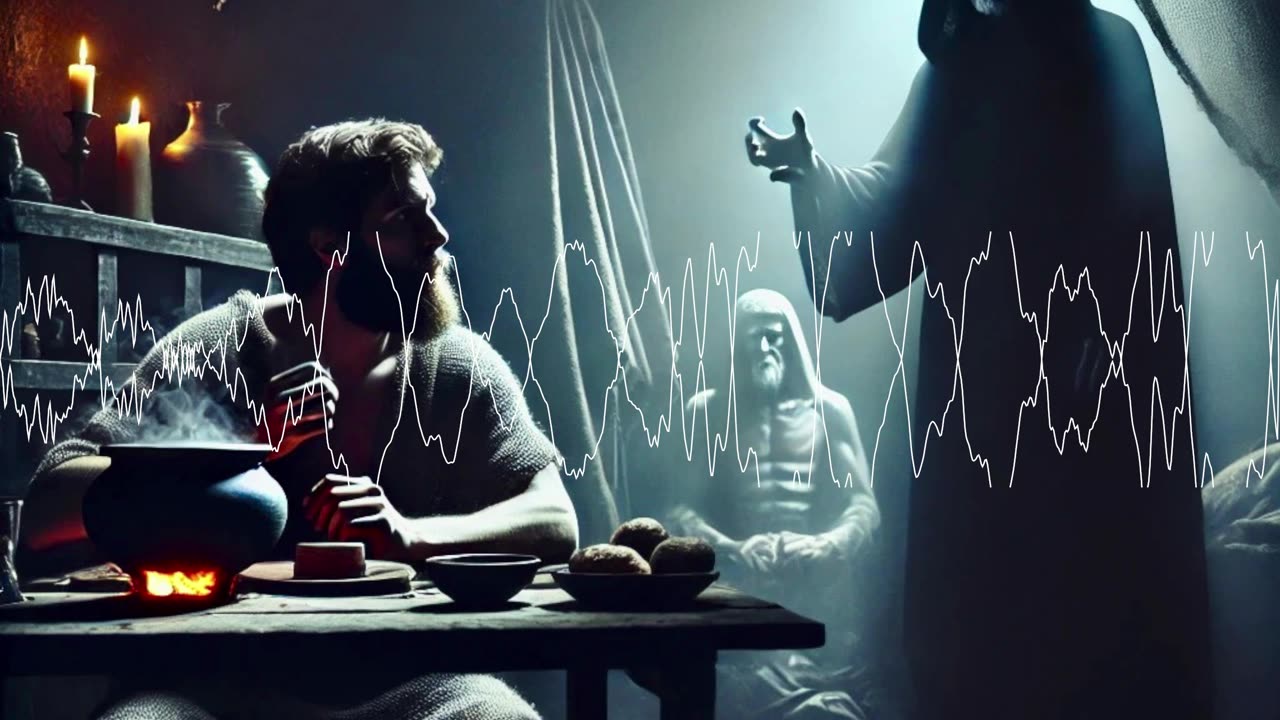Premium Only Content

In 1 Samuel 28 Saul's Final Descent A Lesson in Desperation, Death, and Unexpected Compassion
Saul, once favored by Yahuah, finds himself isolated and desperate, turning to a forbidden medium to consult the spirit of the prophet Samuel. This act of disobedience reveals the depths of Saul's spiritual decline. The chapter also touches on the biblical concept of death, highlighting that the dead are asleep until the resurrection, much like Yahusha's description of Lazarus. Despite the darkness of the moment, the medium shows compassion, offering Saul a final meal. This story serves as a powerful reminder of the consequences of straying from Yahuah's path and the importance of understanding the true nature of death and resurrection.Understanding Death as Sleep in Scripture:
The concept of death as a state of sleep until the resurrection is a recurring theme in the Bible. This understanding helps us grasp what happens after death and what we can expect when Yahuah calls us to rise again.
1. Samuel Didn’t Go to Heaven Immediately:
In 1 Samuel 28, when the prophet Samuel is summoned by the medium of Endor, he doesn’t speak from heaven but rather from the place of the dead, showing that he was at rest, not in heaven. This aligns with the biblical view that the dead are asleep until the resurrection.
2. Yahusha's Teaching About Lazarus:
In John 11, Yahusha speaks about Lazarus’ death, saying, “Our friend Lazarus has fallen asleep; but I am going there to wake him up” (John 11:11). The disciples misunderstood, thinking Yahusha meant natural sleep. But Yahusha clarified, “Lazarus is dead” (John 11:14). Here, Yahusha uses the metaphor of sleep to describe death, indicating that Lazarus, like others who die, was at rest until Yahusha called him back to life.
3. The Thief on the Cross:
Many cite the conversation between Yahusha and the thief on the cross as evidence of immediate entry into paradise after death. Yahusha says, “Truly, I say to you, today you will be with me in paradise” (Luke 23:43). However, considering the original Greek text, the placement of punctuation can change the meaning. It’s more accurate to understand Yahusha’s statement as, “Truly, I say to you today, you will be with me in paradise.” This interpretation aligns with the idea that the thief, like all who die, would rest until the resurrection.
4. The Big Resurrection:
The Bible consistently describes a future resurrection when all who have died will be raised. As Yahusha said in John 5:28-29, “Do not marvel at this, for an hour is coming when all who are in the tombs will hear his voice and come out, those who have done good to the resurrection of life, and those who have done evil to the resurrection of judgment.” This event is what we all await, a time when we will be awakened from the sleep of death to stand before Yahuah.
5. We Rest Until That Day:
Ecclesiastes 9:5 tells us, “For the living know that they will die, but the dead know nothing; they have no further reward, and even their name is forgotten.” This reinforces the idea that in death, we are in a state of unconscious rest, unaware of the passage of time or events until we are resurrected.
Conclusion:
Scripture teaches that death is a sleep, a period of unconscious rest until Yahuah calls us to rise at the resurrection. Whether we’ve been asleep for days, years, or centuries, it will feel like an instant when we awake to the new reality Yahuah has promised. This understanding provides comfort and clarity about the nature of death and the hope of resurrection.
-
 4:37:57
4:37:57
Drew Hernandez
1 day agoNEW EPSTEIN EMAIL DROP FULLY POLITICIZED
63.5K30 -
 1:44:01
1:44:01
Tucker Carlson
7 hours agoTucker Carlson on the Israel First Meltdown and the Future of the America First Movement
74.8K443 -
 4:02:08
4:02:08
Alex Zedra
7 hours agoLIVE! Phasmaphobia New Map!
59.9K3 -
 2:16:06
2:16:06
Laura Loomer
9 hours agoEP155: Jihad Makes Its Move On The White House
51.9K63 -
 2:18:47
2:18:47
TheSaltyCracker
9 hours agoDem's Epstein Drop Backfires ReeEEStream 11-12-25
114K220 -
 17:08
17:08
Demons Row
9 hours ago $5.71 earnedMost Dangerous Motorcycle Clubs That Ever Existed 💀🔥
40.4K4 -
 12:51
12:51
The Gun Collective
10 hours agoWOW! -- LOTS of new GUNS just came out!
21.3K10 -
 2:06:53
2:06:53
I_Came_With_Fire_Podcast
18 hours agoWhat IS America First | Al Qaeda in the White House | China's Spy Highway
17.4K5 -
 1:46:55
1:46:55
Adam Does Movies
13 hours ago $1.45 earnedTalking Movies + Ask Me Anything - LIVE
12.9K -
 1:30:33
1:30:33
Glenn Greenwald
11 hours agoMAGA Outrage Over Trump's Plan for More H-1B Visas: With Prof. Ron Hira; Latest Epstein/Israel Revelations and Newly Released Emails: With Drop Site's Murtaza Hussain | SYSTEM UPDATE #546
130K45